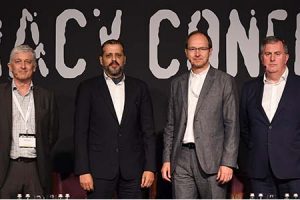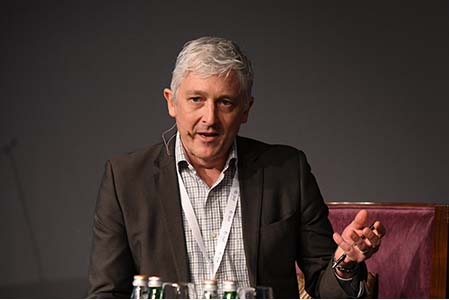Panellists concluded BroadcastPro MEs inaugural Anti-Piracy Conference with a call for consistent deployment of technology and the creation of a centralised registry for MENA content ownership. The final panel of the BroadcastPro Anti-Piracy Conference dealt with various strategies, both commercial and technical, that could be applied to fight piracy. Joining us for this discussion were […]

Panellists concluded BroadcastPro MEs inaugural Anti-Piracy Conference with a call for consistent deployment of technology and the creation of a centralised registry for MENA content ownership.
The final panel of the BroadcastPro Anti-Piracy Conference dealt with various strategies, both commercial and technical, that could be applied to fight piracy. Joining us for this discussion were a panel of seasoned professionals from different parts of the industry: Dr Naser Refaat, CTO of Rotana Media Group; Petr Peterka, CTO of Verimatrix; and Mike Barley, Non-executive Chairman of UK-based anti-piracy firm FACT.
Alex Borland, Head of Media Sales EMEA at Ericsson, moderated the discussion. He opened with a question to Petr Peterka about the technologies companies provide within this space and how they can be used effectively.
Peterka commented that technology helps both sides and if used correctly and consistently, can contain piracy to a great extent.

There are different aspects to anti-piracy technology. One is prevention. We use cryptography, conditional access and digital rights management to prevent the leakage of content to unauthorised users. The second step is the ability to trace the source of the content and forensic watermarking is a part of the solution for this. Finally, we have the ability to collect and analyse a lot of data from the end-to-end distribution chain. By understanding what is happening in the network, understanding the devices and how people consume content and how they use it, we can monitor for threats and trace piracy in ways in which we could not in the past.
Borland then asked Barley to relate some of his experiences in the UK, where he has had a lot of success fighting piracy as part of the Sky team, where he has worked for a long time alongside his role at FACT.
Barley agreed that using technology is absolutely key to getting ahead of the pirates, and we have used it effectively over the years. He cited the example of two people in the UK who were sentenced to four-and-a-half years in prison for selling Kodi boxes during the Premier League season.
That was a good sentence. We used technology and search tools to discover this information. We used search tools and went through 36 auction sites. The information was available across social media, Facebook, Twitter and the like, and we used key search terms. Then we harnessed that information and used it to make prosecution cases.
When asked if there was any need to prosecute a 14-year-old, based on a discussion in the previous panel, Barley agreed that there wasnt.

We operate a strategy in the UK which takes a multi-faceted approach, in that you either deter through public awareness or you engage with the advertisers, the payment providers, and disrupt the activities of the pirates. Of course, the last part is detection and prosecution and it only serves a purpose if it is executed at the right level. You want the prosecution to have the right impact so that people who read about it on social media should think, I dont want to go to prison, it is not worthwhile. It is that multi-faceted approach to piracy that is effective.
He went on to add that for prosecutions to be effective, you must harness technology to gain as much information as possible about a case.
Id like to see much more collaboration with using that information. In individual silos, all of us gather a lot of information but if we harnessed it together, it would be a lot more useful.
Dr Naser Refaat, CTO of Rotana, pointed out that the real problem lies elsewhere. He lamented the lack of a centralised registration centre where buyers could check the authenticity of the people selling content to them.
Egypt is the only country that has a Cinema Chamber and issues a certificate should you want to buy and sell Egyptian films in the region. This certificate provides the buyer with some semblance of security, he commented, adding that there is no contract authentication registration body in the MENA region for any produced drama, documentaries, music clips ownership or distribution rights.
He pointed out that in many instances, so-called pirates were unwitting victims who had bought content from someone who claimed to have the right to sell it. He went further to suggest that all players put an additional sum of money towards the cause so that telcos and satellite operators would be incentivised to be more proactive.
If I pay 100K per mega now, lets make it 101K and ensure that everything is fingerprinted and watermarked, and not just our own content. If there is integration with the telcos and satellite operators in terms of paying to a central regulatory unit, it is likely we will meet with more success.
He commented that if governments are unwilling to take a positive step, then one should go above them to the Arab League, as he and his team are doing now.

Now there are initiatives in Egypt with certain bodies of intelligence to start this union. Presently, if you want to buy a movie that Rotana owns, you go to the Egyptian Chamber of Commerce and pay $1,000, but this does not truly contribute to distribution rights management. Rather than paying that amount, pay the union an annual fee to host all media content ownerships and distribution rights transparently in an online database. Those fees will be distributed between the telcos, the satellite operators, the Cinema Chamber, the union and so on, creating a win-win situation for all. We are in the process of discussing a model at present.
Borland asked Barley to elaborate on the four-year sentence for the two men selling Kodi boxes he had alluded to previously, and how they went about identifying the right people to prosecute.
We used a technology that searched for the auction sites to find the sellers of Kodi boxes, and of course, there are thousands of them, explained Barley. You dont just pick on any seller. You put together an investigation and find out how many boxes each of them have sold and make your case.
Egypt is the only country that has a Cinema Chamber and issues a certificate should you want to buy and sell Egyptian films in the region Dr Naser Refaat, CTO, Rotana Media Group
We found that two people were selling an awful lot of boxes, and their criminal gain was almost £1.8m. We used technology to identify key sellers and only they needed to be prosecuted. We went to the Premier League and told them that we had identified these individuals and we put together an evidence pack, supported by technical information. Then they bought some Kodi boxes from these guys.
The courts in the UK understand that piracy is a crime and so they will pass sentences of a certain length. You dont prosecute just anybody. Sky worked to prosecute these two men because their criminal gain was to the tune of £1.8m.

Barley said prison sentences are a significant deterrent for people engaging in a criminal act.
Having a strategy that reflects the deterrence factor is really important. Companies like Sky dont say we are going to prosecute our end users. Organisations like FACT are quite happy to front up that publicity, and they have worked over the years to get publicity around these types of cases. Generating that sort of publicity raises the awareness not only among the public, but among judges as well. Judges read the papers too. There are sentencing guidelines in the UK, so the judge would look at the tariff and the matrix, and then decide on the sentence. Then it has the right impact.
He added that unless the regulators take piracy seriously, nothing will come of it, and that broadcasters depend on the underlying infrastructure, judicial support and the regulator to be effective in the fight against piracy.
Peterka stepped in at this point to state that if technology is used effectively and integrated correctly across all the points within a distribution chain, it would be possible to curtail piracy significantly.
By understanding what is happening in the network, understanding the devices and how people consume content and how they use it, we can monitor for threats and trace piracy in ways in which we could not in the past Petr Peterka, Cto, Verimatrix
You have the technology today to detect piracy in real time; you can identify the source and, in many cases, they are your legal subscribers who are stealing your content and redistributing it. If in real time you can track them down, you can also close them down instantly. In the meantime, you can continue with the prosecution and make sure there are no repeated attempts. If you use the technology consistently across the entire distribution chain and align your technology and operational strategy in real time, you can actually disrupt the hackers network enough to deter them.
Peterka said disrupting a service at a crucial point is very effective in deterring piracy.
Disruption serves as a very powerful tool. If I am paying for my pirated service because most of them are paid or ad-supported and I cant rely on them to watch a game all the way to the end because it will get disrupted in the middle, its very likely that I will pay for a legal subscription.
Barley added that this has worked at Sky. We used to take a big sport and look at the matches. We used to employ technology to identify which subscriber was illegally distributing content to thousands of other end users. Once we identified them, we would tell the guys to switch that card off when the bell sounds at the first round. That is a massive disruption, because thousands of screens will go blank just at that crucial point in the match. People will get fed up when that happens and pay for their services. Then we will look to prosecute that subscriber.
The idea is to convert people to buy the proper package. We dont want them to be uneasy. The disruption strategy needs to be employed by the industry. Dr Refaat pointed out that such a strategy works only within a pay TV environment. In a region where there are nearly 1,100 Arabic-speaking channels, of which 80% are free-to-air over satellite, this is not possible. Barley conceded the point. Summing up that multiple strategies were required to tackle pirates, Borland asked Peterka if he sees international giants in the business as a help or a hindrance. Peterka commented that globally, consistency in protecting content is the key to fighting piracy.
We operate a strategy in the UK which takes a multifaceted approach, in that you either deter through public awareness or you engage with the advertisers, the payment providers, and disrupt the activities of the pirates Mike Barley, Non-Executive Chairman, FACT
One of the problems that the industry has is the inconsistency of requiring certain technological content protection techniques. We had discussions about watermarking. It is a relatively new technology because, although it has been around for many years, it hasnt been used as effectively until recently. You have pockets of the world where it is used and parts where it is not. People use it as an argument if the content gets stolen from the place where it is not used, why did I invest money in watermarking that content?
So watermarking should be consistently used across the chain. International treaties should ensure that content owners who sell content to different owners must ask for that consistency in their contracts and ensure that buyers comply.
Barley added that it takes a lot of time to shut down websites and pointed out that we should engage a lot more with global platforms, advertisers, payment providers and anyone else who facilitates cash flow to the pirates.
We got Amazon to adjust their search terms by lobbying them and saying to them that fully loaded Kodi boxes facilitate piracy. It also goes on to advertisers. Criminals will want to advertise on their website, and that gives them legitimacy. Also, advertisers dont realise that their ads are showing up on pirate websites.
In the UK, we are now engaging more with the payment providers. Pirates are in this only for the money. If we identify a pirate seller and let the payment providers know that a person is using their facility for criminal gain, and ask them if they want to be associated with that, they will say no. The pirate will find an alternative mechanism. There is a strategy of following the protected content and tracing the content and strategy around the cash flow, and working backwards to understand where the sources are and blocking those payment gateways.
Borland asked Dr Refaat if something similar can be applied in the Middle East.
Definitely yes. With persistence and cooperation with everyone in this room, I think we can make things happen. Piracy is accepted as a normal practice in the region by a majority of the people. The solution is whether we continue losing our content and continue producing more, or put strict regulations from the top down to cover all corners and make sure that we spend more time and effort between everybody here to push for proper regulations across the line.
Borland then steered the discussion to hackers and asked Peterka if it was wise to use them in the fight against piracy.
It is a sensitive question, but you do need to understand how criminals think and how they are going to attack your system, and which part of your end-to-end distribution network has the weakest point, he commented.
Understanding how they do things is very important. White hat hacking is becoming a trend in the industry. It is good to bring clever minds to the right side of the industry. They do it for money or fame; if you pay them enough and let them speak at conferences, you can achieve similar things. They can be a valuable asset, but you have to be very careful how you pick them. Your engineers dont think like the hackers, and when they design a product, they dont necessarily understand how they will be attacked so hackers are significant.
With all these strategies in place, Borland asked if Barley and his team had managed to get ahead of the pirates. Barley commented that when the UK succeeds in countering piracy, the problem merely shifts to another geography where regulations are not as stringent.
I dont think we are ahead of the pirates in the UK. I have been working on this for 18 years. We have not eradicated the problem. At best, we have displaced the problem, which means someone who was operating illegally in the UK finds out we are cracking down on him. So he moves to another territory and continues. Essentially, when its no longer our problem, it becomes someone elses problem. So for instance, I dont see an awful lot of piracy on the Sky platform, but we see it elsewhere. We have displaced it, but that only underlines the argument for a greater collaborative approach.
He pointed out that not enough is being done that streaming content is like driving down the road at 32 miles an hour when the limit is 30.
Nobody is going to do anything about it. If that same attitude occurs within the audio-visual content space, we have real problems coming up, because we have a whole generation of people who think it is okay to stream illegal content. That has a massive impact on this industry, the creative industry and broadcast. It is about changing the mindsets of people, and you can only do this by raising awareness and using the media to a great extent to highlight the dangers of streaming content and visiting pirate websites.
He added that a majority of pirate websites have some form of malware on them, leading to credit card scams, data stealing and the like.
All three panellists agreed that awareness is important and that education begins at home with our children. Barley pointed out that Sky spends £6bn a year acquiring content, so it only makes sense for them to also invest money in protecting it. Peterka added that as long as the same protection mechanisms are not followed across the world, pirates will go to a place where there is no protection.
Consistency is critical to our success, he reiterated.
In conclusion, the panellists agreed on the importance of having technology deployed consistently across the distribution chain to ensure there are no weak links. They also agreed that if greater awareness is created among payment providers, search engines, shopping sites, web platforms and unwitting advertisers, satellite operators and telcos, the cash flow to pirates can be reduced significantly. On a regional level, they advocated for a centralised body to check the authenticity of the distribution rights of the content being sold or bought, and for better regulations from the ITU.















































































